第七部分正说反译,反说正译
- 格式:docx
- 大小:17.69 KB
- 文档页数:4

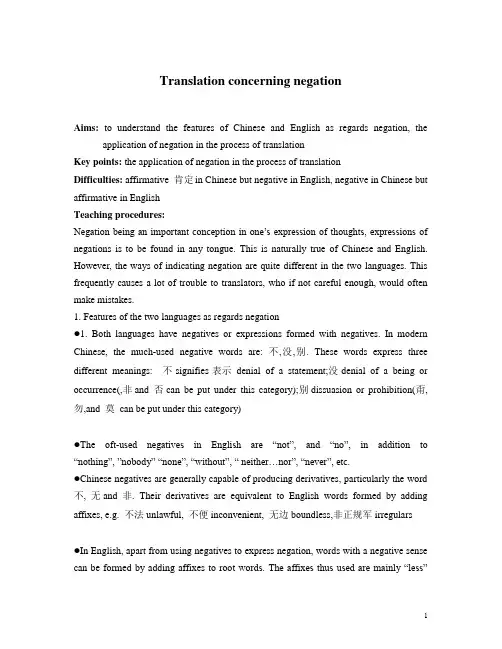
Translation concerning negationAims: to understand the features of Chinese and English as regards negation, the application of negation in the process of translationKey points: the application of negation in the process of translationDifficulties: affirmative 肯定in Chinese but negative in English, negative in Chinese but affirmative in EnglishTeaching procedures:Negation being an important conception in one’s expression of thoughts, expressions of negations is to be found in any tongue. This is naturally true of Chinese and English. However, the ways of indicating negation are quite different in the two languages. This frequently causes a lot of trouble to translators, who if not careful enough, would often make mistakes.1. Features of the two languages as regards negation●1. Both languages have negatives or expressions formed with negatives. In modern Chinese, the much-used negative words are: 不,没,别. These words express three different meanings: 不signifies表示denial of a statement;没denial of a being or occurrence(,非and 否can be put under this category);别dissuasion or prohibition(甭,勿,and 莫can be put under this category)●The oft-used negatives in English are “not”, and “no”, in addition to “nothing”, ”nobody” “none”, “without”, “ neither…nor”, “never”, etc.●Chinese negatives are generally capable of producing derivatives, particularly the word 不, 无and 非. Their derivatives are equivalent to English words formed by adding affixes, e.g. 不法unlawful, 不便inconvenient, 无边boundless,非正规军irregulars●In English, apart from using negatives to express negation, words with a negative sense can be formed by adding affixes to roo t words. The affixes thus used are mainly “less”suffix “un” “in”, and “non”●However, English words formed with affixes with a negative, while adjective and nouns formed with “un” such as “unavoidable” and “unbelief” are negative, for instance, verbs forme d with affixes such as “unclasp” and “uncork” affirmative.●In Chinese, words formed with negatives are generally negative in sense but in some cases they assume new meaning like 非常, which practically means 很.●In English, the same word formed with a different affix differs in meaning (compare discord with uncord). Sometimes, words formed with different affixes 词缀with a negative sense would produce words with different implications含义---derogatory贬义and the other non-derogatory褒义. For instance, immoral means 不道德,and is therefore derogatory while unmoral means 非道德,无道德观念的,and is therefore non derogatory. 1.W arm-up exercises2.I don't’ think Tom is correct.3.I don’t think Xiaoming is coming tomorrow.4.A re you not going tomorrow?---- No, I am not going .5.A frica is not kicking out W estern imperialism in order to invite other new masters.6.T he world today is far from peaceful.7.O ur PLA is worthy of being called a great army of the people.8.H e tried his best to overcome the lack of technical data.9.T he window refused to open.10.Y esterday he failed to get to school on time.11.They excluded children from getting in.12.The building is in a state of neglect.13.He is often absent- minded.14.To do this is beyond me.15.Lei Feng’s noble deeds are above all praise.16.I, rather than you , should do the work.17.The truth is quite other than what you think.18.She refrained from laughing.19.She was refused admitance by them.20.An opportunity is not likely to repeat itself.21.Live up to the expectations of our own people and the people throughout the world.22.Slips are scarely avoidable when you are new to your work.23.The meetings were marked by such an absence of lively discussions that at times they were almost on the piont of breaking up.24.Avoid operating the keys roughly.25.The scientists made a solemn plege at the conference, saying, “W e’ll forever live up to what our Party expecs of us.”26.The evidence is conclusive, excluding all possibilities of doubt.27.That fellow is far from being honest.28.Luan Ping stood still, trying vainly (in vain) to answer the battery of questions Y ang Zirong raised.29.That served to strenghen instead of weaken our determination.30.But for their help. W e should not succeeded in this experiment.31.All that glitters is not gold.32.All is not lost.33.All criminals are murderers.34.But aal men are born to reign.35.All that flatter you too much are not faithful friends.36.Both children are not clever.37.W e never thought of nothing wrong.我们从来没有想到有什么错误。
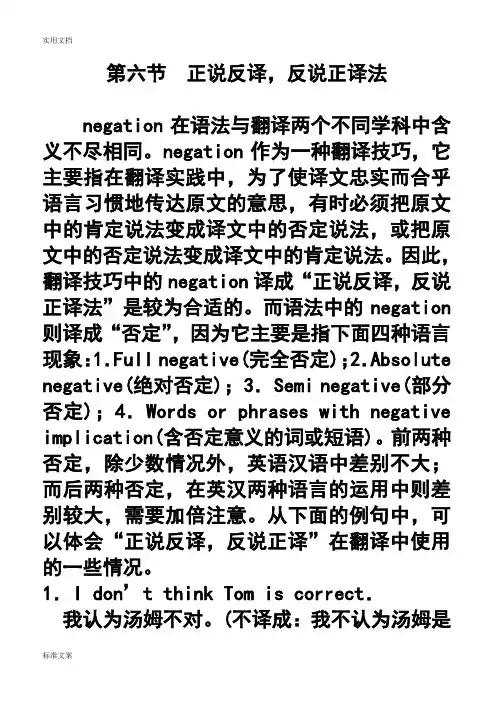
第六节正说反译,反说正译法negation在语法与翻译两个不同学科中含义不尽相同。
negation作为一种翻译技巧,它主要指在翻译实践中,为了使译文忠实而合乎语言习惯地传达原文的意思,有时必须把原文中的肯定说法变成译文中的否定说法,或把原文中的否定说法变成译文中的肯定说法。
因此,翻译技巧中的negation译成“正说反译,反说正译法”是较为合适的。
而语法中的negation 则译成“否定”,因为它主要是指下面四种语言现象:1.Full negative(完全否定);2.Absolute negative(绝对否定);3.Semi negative(部分否定);4.Words or phrases with negative implication(含否定意义的词或短语)。
前两种否定,除少数情况外,英语汉语中差别不大;而后两种否定,在英汉两种语言的运用中则差别较大,需要加倍注意。
从下面的例句中,可以体会“正说反译,反说正译”在翻译中使用的一些情况。
1.I don’t think Tom is correct.我认为汤姆不对。
(不译成:我不认为汤姆是对的。
)2.我想小李明天不会来了。
I don’t think Xiao Li will cometomorrow.(不译成:I think Xiao Li won't come tomorrow.)3.A:Are you not going tomorrow?B I'm not going.甲:你明天不去吗?4.①Africa is not kicking out Western imperialism ②in order to invite other new masters.进其他新的统治者。
(假如不运用“正说反译,反说正译”这一技巧,译文就会成为:新的主子。
”其义则大相径庭。
)他来这儿不是为了求得我们的帮助。
误:He came here not to ask us for help.正:He did not come here to ask us for help.否定状语时,英语中的否定词一般不直接置于被否定词语前,通常置于谓语动词前。
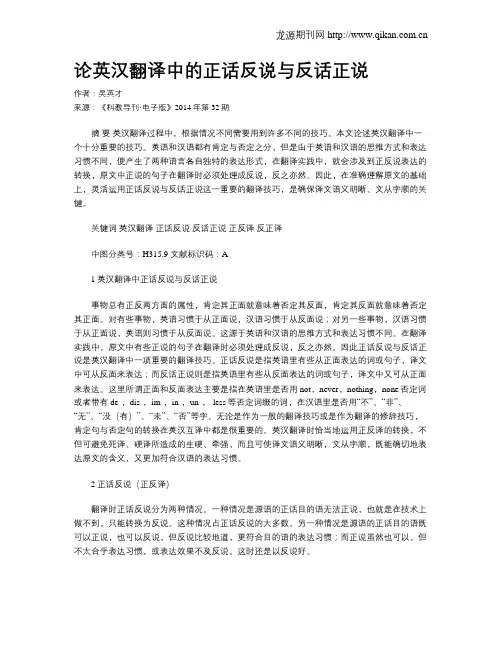
论英汉翻译中的正话反说与反话正说作者:吴英才来源:《科教导刊·电子版》2014年第32期摘要英汉翻译过程中,根据情况不同需要用到许多不同的技巧。
本文论述英汉翻译中一个十分重要的技巧。
英语和汉语都有肯定与否定之分,但是由于英语和汉语的思维方式和表达习惯不同,便产生了两种语言各自独特的表达形式,在翻译实践中,就会涉及到正反说表达的转换,原文中正说的句子在翻译时必须处理成反说,反之亦然。
因此,在准确理解原文的基础上,灵活运用正话反说与反话正说这一重要的翻译技巧,是确保译文语义明晰、文从字顺的关键。
关键词英汉翻译正话反说反话正说正反译反正译中图分类号:H315.9 文献标识码:A1英汉翻译中正话反说与反话正说事物总有正反两方面的属性,肯定其正面就意味着否定其反面,肯定其反面就意味着否定其正面。
对有些事物,英语习惯于从正面说,汉语习惯于从反面说;对另一些事物,汉语习惯于从正面说,英语则习惯于从反面说。
这源于英语和汉语的思维方式和表达习惯不同。
在翻译实践中,原文中有些正说的句子在翻译时必须处理成反说,反之亦然。
因此正话反说与反话正说是英汉翻译中一项重要的翻译技巧。
正话反说是指英语里有些从正面表达的词或句子,译文中可从反面来表达;而反话正说则是指英语里有些从反面表达的词或句子,译文中又可从正面来表达。
这里所谓正面和反面表达主要是指在英语里是否用not,never,nothing,none否定词或者带有de-,dis-,im-,in-,un-,-less等否定词缀的词,在汉语里是否用“不”、“非”、“无”、“没(有)”、“未”、“否”等字。
无论是作为一般的翻译技巧或是作为翻译的修辞技巧,肯定句与否定句的转换在英汉互译中都是很重要的。
英汉翻译时恰当地运用正反译的转换,不但可避免死译、硬译所造成的生硬、牵强,而且可使译文语义明晰,文从字顺,既能确切地表达原文的含义,又更加符合汉语的表达习惯。
2正话反说(正反译)翻译时正话反说分为两种情况。


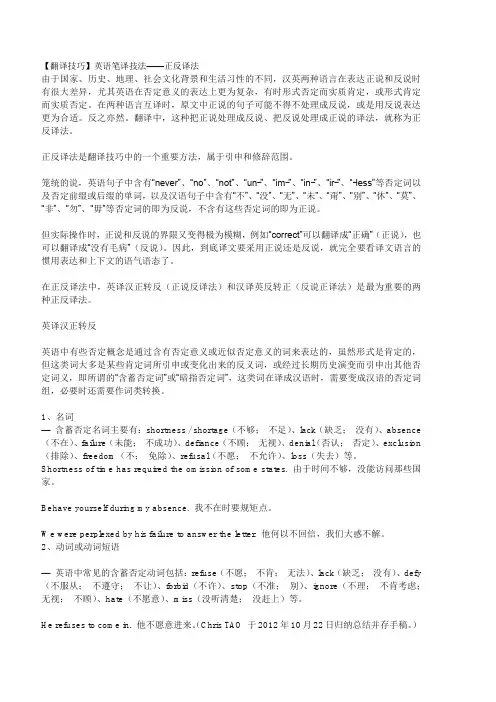
【翻译技巧】英语笔译技法——正反译法由于国家、历史、地理、社会文化背景和生活习性的不同,汉英两种语言在表达正说和反说时有很大差异,尤其英语在否定意义的表达上更为复杂,有时形式否定而实质肯定,或形式肯定而实质否定。
在两种语言互译时,原文中正说的句子可能不得不处理成反说,或是用反说表达更为合适。
反之亦然。
翻译中,这种把正说处理成反说、把反说处理成正说的译法,就称为正反译法。
正反译法是翻译技巧中的一个重要方法,属于引申和修辞范围。
笼统的说,英语句子中含有“never”、“no”、“not”、“un-”、“im-”、“in-”、“ir-”、“-less”等否定词以及否定前缀或后缀的单词,以及汉语句子中含有“不”、“没”、“无”、“未”、“甭”、“别”、“休”、“莫”、“非”、“勿”、“毋”等否定词的即为反说,不含有这些否定词的即为正说。
但实际操作时,正说和反说的界限又变得极为模糊,例如“correct”可以翻译成“正确”(正说),也可以翻译成“没有毛病”(反说)。
因此,到底译文要采用正说还是反说,就完全要看译文语言的惯用表达和上下文的语气语态了。
在正反译法中,英译汉正转反(正说反译法)和汉译英反转正(反说正译法)是最为重要的两种正反译法。
英译汉正转反英语中有些否定概念是通过含有否定意义或近似否定意义的词来表达的,虽然形式是肯定的,但这类词大多是某些肯定词所引申或变化出来的反义词,或经过长期历史演变而引申出其他否定词义,即所谓的“含蓄否定词”或“暗指否定词”,这类词在译成汉语时,需要变成汉语的否定词组,必要时还需要作词类转换。
1、名词—含蓄否定名词主要有:shortness / shortage(不够;不足)、lack(缺乏;没有)、absence (不在)、failure(未能;不成功)、defiance(不顾;无视)、denial(否认;否定)、exclusion (排除)、freedom(不;免除)、refusal(不愿;不允许)、loss(失去)等。
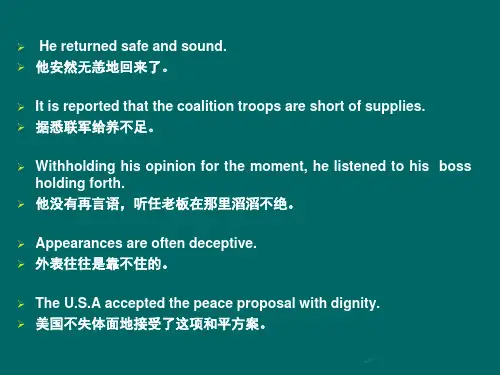

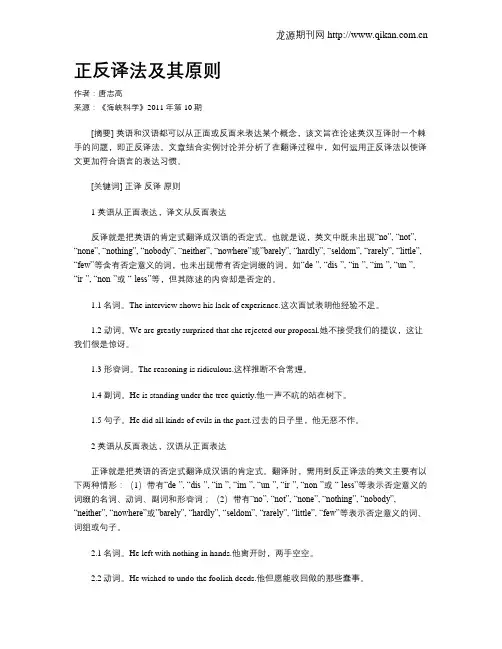
正反译法及其原则作者:唐志高来源:《海峡科学》2011年第10期[摘要] 英语和汉语都可以从正面或反面来表达某个概念,该文旨在论述英汉互译时一个棘手的问题,即正反译法。
文章结合实例讨论并分析了在翻译过程中,如何运用正反译法以使译文更加符合语言的表达习惯。
[关键词] 正译反译原则1 英语从正面表达,译文从反面表达反译就是把英语的肯定式翻译成汉语的否定式。
也就是说,英文中既未出现“no”, “not”, “none”, “nothing”, “nobody”, “neither”, “nowhere”或”barely”, “hardly”, “seldom”, “rarely”, “little”, “few”等含有否定意义的词,也未出现带有否定词缀的词,如“de-”, “dis-”, “in-”, “im-”, “un-”, “ir-”, “non-”或“-less”等,但其陈述的内容却是否定的。
1.1名词。
The interview shows his lack of experience.这次面试表明他经验不足。
1.2 动词。
We are greatly surprised that she rejected our proposal.她不接受我们的提议,这让我们很是惊讶。
1.3 形容词。
The reasoning is ridiculous.这样推断不合常理。
1.4 副词。
He is standing under the tree quietly.他一声不吭的站在树下。
1.5 句子。
He did all kinds of evils in the past.过去的日子里,他无恶不作。
2 英语从反面表达,汉语从正面表达正译就是把英语的否定式翻译成汉语的肯定式。
翻译时,需用到反正译法的英文主要有以下两种情形:(1)带有“de-”, “dis-”, “in-”, “im-”, “un-”, “ir-”, “non-”或“-less”等表示否定意义的词缀的名词、动词、副词和形容词;(2)带有“no”, “not”, “none”, “nothing”, “nobody”, “neither”, “nowhere”或”barely”, “hardly”, “seldom”, “rarely”, “little”, “few”等表示否定意义的词、词组或句子。
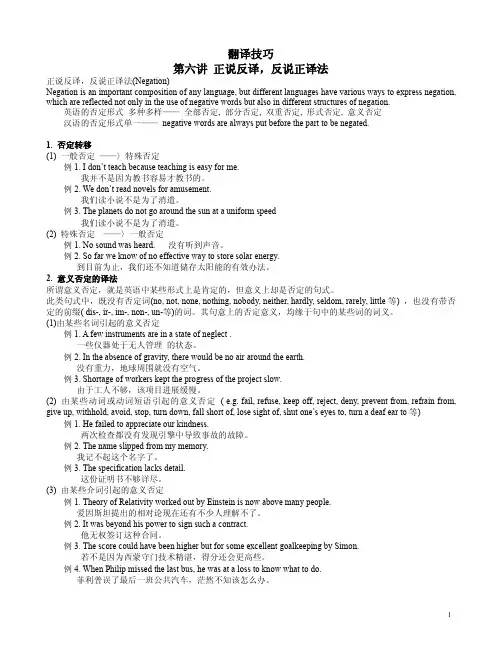
翻译技巧第六讲正说反译,反说正译法正说反译,反说正译法(Negation)Negation is an important composition of any language,but different languages have various ways to express negation, which are reflected not only in the use of negative words but also in different structures of negation.英语的否定形式多种多样——全部否定,部分否定,双重否定,形式否定,意义否定汉语的否定形式单一——negative words are always put before the part to be negated.1.否定转移(1)一般否定——〉特殊否定例1.I don’t teach because teaching is easy for me.我并不是因为教书容易才教书的。
例2.We don’t read novels for amusement.我们读小说不是为了消遣。
例3.The planets do not go around the sun at a uniform speed我们读小说不是为了消遣。
(2)特殊否定——〉一般否定例1.No sound was heard.没有听到声音。
例2.So far we know of no effective way to store solar energy.到目前为止,我们还不知道储存太阳能的有效办法。
2.意义否定的译法所谓意义否定,就是英语中某些形式上是肯定的,但意义上却是否定的句式。
此类句式中,既没有否定词(no,not,none,nothing,nobody,neither,hardly,seldom,rarely,little等),也没有带否定的前缀(dis-,ir-,im-,non-,un-等)的词。
第六节正说反译,反说正译法negation在语法与翻译两个不同学科中含义不尽相同。
negation作为一种翻译技巧,它主要指在翻译实践中,为了使译文忠实而合乎语言习惯地传达原文的意思,有时必须把原文中的肯定说法变成译文中的否定说法,或把原文中的否定说法变成译文中的肯定说法。
因此,翻译技巧中的negation译成“正说反译,反说正译法”是较为合适的。
而语法中的negation则译成“否定”,因为它主要是指下面四种语言现象:1.Full negative(完全否定);2.Absolute negative(绝对否定);3.Semi negative(部分否定);4.Words or phraseswith negative implication(含否定意义的词或短语)。
前两种否定,除少数情况外,英语汉语中差别不大;而后两种否定,在英汉两种语言的运用中则差别较大,需要加倍注意。
从下面的例句中,可以体会“正说反译,反说正译”在翻译中使用的一些情况。
1.I don’t think Tom is correct.我认为汤姆不对。
(不译成:我不认为汤姆是对的。
)2.我想小李明天不会来了。
I don’t think Xiao Li will come tomorrow.(不译成:I think Xiao Li won't come tomorrow.)3.A:Are you not going tomorrow?B I'm not going.甲:你明天不去吗?4.①Africa is not kicking out Western imperialism ②in order to inviteother new masters.进其他新的统治者。
(假如不运用“正说反译,反说正译”这一技巧,译文就会成为:新的主子。
”其义则大相径庭。
)他来这儿不是为了求得我们的帮助。
误:He came here not to ask us for help.正:He did not come here to ask us for hel p.否定状语时,英语中的否定词一般不直接置于被否定词语前,通常置于谓语动词前。
第七部分 正说反译,反说正译 英译汉 1. It is wiser than to believe what you call money talks 。 我不至于蠢到相信你说的金钱万能呢。 2. He could do anything he was asked to do but return to his old life. 叫他干什么他都愿意,只要不让他再过从前的日子。 3. All graduates from Foreign Language Institutes will not be appointed to do translation work. 外院的学生并非都被分配去做翻译工作。
4. Africa is not kicking out western imperialism in order to invite other new master. 非洲踢出西方帝国主义,不是为了请进新的主人。 5. Both sides thought that the peace proposal was one they could accept with dignity. 双方都认为开会不失体面地接受这样的和平方案。 6. One could not be too careful in a new neighborhood. 新到一个陌生的邻里,越小心越好。 7. Nothing is so beautiful but it betrays some defect on close inspection. 再漂亮的东西,只要仔细观察,也会发现某种缺陷。 8. The moon is a world that is completely and utterly dead, a sterile mountainous waste. 月球上北京一个毫无生机的世界,是多山的不毛之地。 9. All the chemical energy of the fuel is not converted into heat. 燃料中的所有化学能并不都转化为热能。 10. All these various losses, great as they are, do not in any way contradict the law of conservation of energy. 所有这些损失,尽管很大,却都没有违反能量守恒定律。
11. All other sources of heat besides the sun would not raise the temperature of the earth 1/4 degree F. 除了太阳以外,所有其他能源都不能把地球的温度升高华氏 12. The contemporary phenomenon of motorcar worship is to be explained not least by the sense of independence and freedom that ownership entails.
崇拜汽车的这种现代现象在很大程度上要从与所有权相伴的独立和自由的意识上来解 释。 13. And this failure to recognize and analyze the interrelationship of linguistic and non- linguistic problems produces two major signs of ineffectiveness.
你没能够意识到和分析出语言和非语言之间的内部联系,才产生了这两种效率低下的 现象。 14. Not all sounds made by animals serve as language, and we have only to turn to that extraordinary discovery of echolocation in bat to see a case in which the voice plays a strictly utilitarian role.
动物发出的声音并不都气语言作用,我们只需要以蝙蝠的固定声位的发现为例,通过 这个不同寻常的事例,我们就能知道声音起着非常实际的作用。 15. Because of the possibility of human error and total reliance on communications between pilots and controller the system will be -dangerous “'fairather than -safe."fail 由于人难免犯错,以及完全依赖飞行员与控制器之间的联系,这一套方法与其说会自
1/4 度。 精品文库
欢迎下载 2 动防止故障,倒不如说会自动发造成危险。 16. I know it is a square peg in a round hole; still, it serves after a fashion. 我知道此物方枘圆凿,十分不配,但尽管如此,还是勉强顶用。 17. One may as well be asleep to read for anything but to improve his mind and morals, and regulate his con duct. 读书若不是为了培养才德端庄品性,还不如睡大觉好。
18. Few things are impossible in themselves: and it is often for want of will, rather than of means, that men fail of success.
事情很少有做不成的,之所以做不成,与其说条件不够,不如说缺乏决心。 19. It is not our view that the substa nee the tone of his remarks this morning will con tribute to creat ing a lasti ng p eace in the Middle East. 我们认为他今天上午讲话的内容和语气将无助于中东地区持久和平的建立。 20. This failure could be blamed on the apparent failure to en sure that com muni cative skill in adequately rep rese nted in Ian guages courses. 这一明显的失败归咎于未能确保把交际技巧适当地用于语言课程当中。 21. The problem is above/beyond me. 这个问题我不懂。
22. But for my elder brother ' s help, I wouldn 要不是我哥哥的帮忙,我就不可能完成这项工作。 23. This equation is far from being complicated. 这个方程式哼简单。 24. I will go fish ing in stead of havi ng less ons. 我要去钓鱼而不是去上课。 25. She is the last woma n I wan ted to sit next to at the dinner. 她是在晚餐间,我最不愿意与之邻座的人。 26. Africa is not kicking out Western imperialism in order to invite other new masters. 非洲将西方帝国主义赶走并不是为了请进其他的新主子。 27. Tom is not altogether satisfied with the result of the exp erime nt. Tom对实验结果并不十分满意。 28. Tom is not satisfied with the result of the exp erime nt. Tom对实验的结果不满意。 29. Tom is not satisfied with the result of the exp erime nt at all. Tom对实验结果一点也不满意。 30. He didn ' t speak clearly and correctly. 他不能讲得既清楚又正确。
31. “Isn ' t the cloth magnificent? ” said the official and the minister. 官员们和大臣们说了一句话: 这块布料多么华丽啊! ” 32. Without numbers, we couldn ‘ t build houses or cities, or make cars or ships. 没有数据,我们既不能建造房屋和城市,也不能建造汽车和轮船。 33. It is a wise father that knows his own child. 再聪明的父亲也未必了解自己的孩子。 34. I don ‘ t believe she is at home, but I will go and see. 我认为她不在家,但是我仍要去看看。 35. He has no reason to think less of himself because he is not dressed in a rich and fashi on able manner.
虽然他没有华丽时尚的仪表,但他也没有理由看不起自己。
't have finished the work.